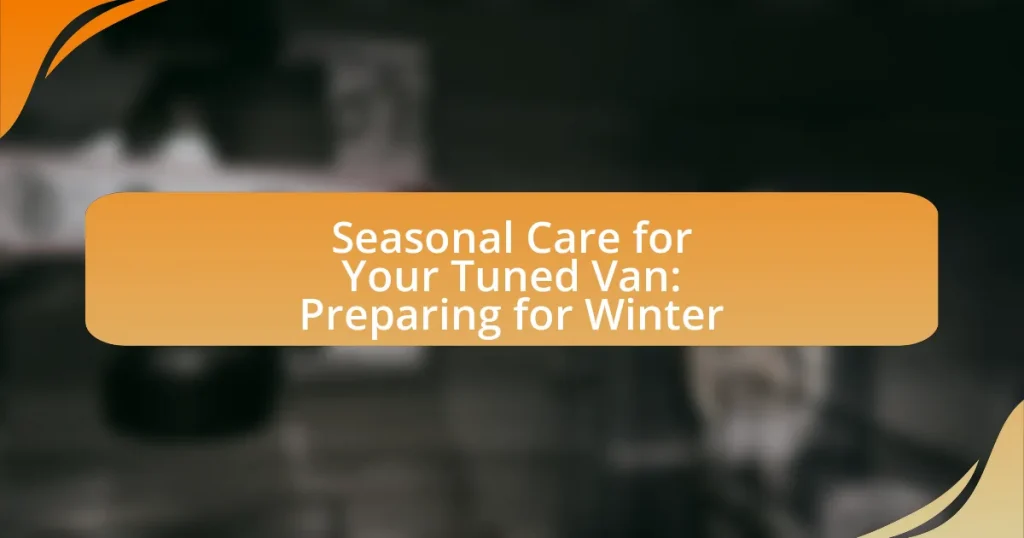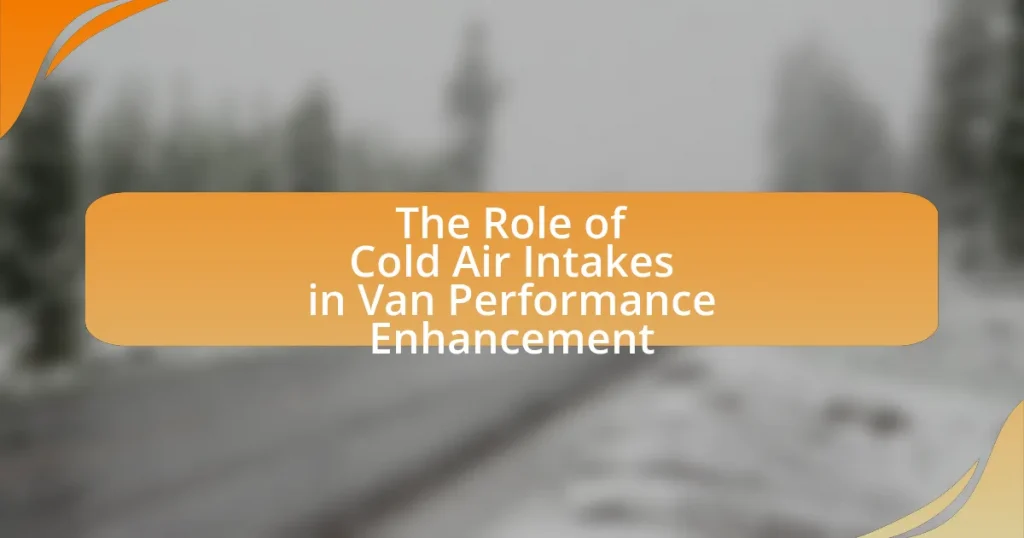Seasonal care for your tuned van during winter is essential for maintaining optimal performance and safety. Key maintenance tasks include checking and replacing antifreeze, inspecting the battery, ensuring proper tire tread depth, and verifying the functionality of the heating system. Cold temperatures can significantly impact engine efficiency, battery life, and tire traction, making regular checks crucial. Additionally, using winter tires and preparing emergency supplies can enhance safety and readiness for winter driving conditions. This article outlines specific challenges posed by winter, practical maintenance tips, and best practices for ensuring your tuned van is winter-ready.

What is Seasonal Care for Your Tuned Van in Winter?
Seasonal care for your tuned van in winter involves several key maintenance tasks to ensure optimal performance and safety. First, check and replace antifreeze to prevent engine freezing, as a proper coolant mixture is crucial for winter operation. Additionally, inspect the battery, as cold temperatures can reduce its efficiency; a fully charged battery is essential for reliable starts.
Next, examine the tires for adequate tread depth and consider switching to winter tires for improved traction on icy roads. It’s also important to ensure that all lights are functioning properly, as visibility can be compromised in winter conditions. Lastly, verify that the van’s heating system is operational to maintain comfort during cold weather. These steps are supported by automotive maintenance guidelines, which emphasize the importance of winter preparations for vehicle safety and performance.
Why is seasonal care important for your tuned van during winter?
Seasonal care is crucial for your tuned van during winter to ensure optimal performance and longevity. Cold temperatures can affect engine efficiency, battery life, and tire traction, making regular maintenance essential. For instance, antifreeze levels must be checked to prevent engine freezing, and battery performance can decline in cold weather, necessitating a thorough inspection. Additionally, winter tires provide better grip on icy roads, enhancing safety. Regularly checking these components can prevent costly repairs and ensure your van operates smoothly in harsh conditions.
What specific challenges does winter pose for tuned vans?
Winter poses specific challenges for tuned vans, primarily due to extreme cold temperatures affecting engine performance and battery efficiency. Cold weather can lead to reduced fuel efficiency, as engines may take longer to reach optimal operating temperatures, impacting overall performance. Additionally, the increased use of electrical systems for heating can drain batteries faster, especially in modified vans with higher power demands. Furthermore, winter road conditions, such as ice and snow, can affect traction and handling, making it crucial for tuned vans to have appropriate tires and suspension adjustments to maintain safety and performance.
How can proper seasonal care enhance the performance of your tuned van?
Proper seasonal care can significantly enhance the performance of your tuned van by ensuring optimal functionality and reliability during varying weather conditions. Regular maintenance tasks, such as checking and replacing fluids, inspecting tire conditions, and ensuring battery health, directly contribute to the van’s efficiency and responsiveness. For instance, maintaining proper tire pressure and tread depth improves traction and handling, which is crucial for a tuned vehicle’s performance, especially in winter conditions. Additionally, using appropriate winter-grade oil can enhance engine performance by ensuring smoother operation in colder temperatures. These practices not only prevent potential breakdowns but also maximize the benefits of the tuning modifications, leading to improved fuel efficiency and overall driving experience.
What are the key components of winter preparation for your tuned van?
The key components of winter preparation for your tuned van include ensuring proper insulation, checking the heating system, maintaining battery health, using winter tires, and preparing emergency supplies. Proper insulation helps retain heat, while a functional heating system ensures comfort during cold weather. Maintaining battery health is crucial, as cold temperatures can reduce battery efficiency. Winter tires provide better traction on snow and ice, enhancing safety. Additionally, preparing emergency supplies, such as blankets, food, and a first aid kit, ensures readiness for unexpected situations.
How should you check and maintain your van’s battery for winter?
To check and maintain your van’s battery for winter, start by inspecting the battery terminals for corrosion and ensuring they are clean and tight. Corrosion can impede electrical flow, so use a mixture of baking soda and water to clean any buildup. Next, test the battery’s voltage with a multimeter; a healthy battery should read around 12.6 volts or higher. If the voltage is below 12.4 volts, consider charging the battery or replacing it if it is old, as batteries typically last 3 to 5 years. Additionally, ensure the battery is securely mounted to prevent vibrations that can damage it. Cold temperatures can reduce battery capacity, so maintaining a full charge is crucial for reliable performance in winter conditions.
What steps should be taken to ensure your van’s tires are winter-ready?
To ensure your van’s tires are winter-ready, check the tire tread depth, maintain proper tire pressure, and consider using winter tires. Adequate tread depth, ideally at least 4/32 of an inch, enhances traction on snow and ice. Maintaining tire pressure is crucial, as cold temperatures can reduce it by about 1 psi for every 10°F drop, affecting handling and safety. Additionally, winter tires are specifically designed with rubber compounds and tread patterns that perform better in cold weather conditions, providing improved grip and control.
How can you protect your tuned van from winter weather conditions?
To protect your tuned van from winter weather conditions, apply a high-quality wax or sealant to the exterior to create a barrier against moisture and road salt. This protective layer helps prevent corrosion and paint damage, which is crucial since winter conditions often involve exposure to harsh elements like ice and snow. Additionally, consider using winter tires designed for improved traction in cold weather, as they enhance safety and performance on slippery roads. Regularly check and maintain the van’s antifreeze levels to prevent engine freezing, and ensure that the battery is in good condition, as cold temperatures can reduce battery efficiency.
What types of protective covers are best for winter storage?
The best types of protective covers for winter storage are heavy-duty tarps, breathable vehicle covers, and custom-fit covers. Heavy-duty tarps provide robust protection against snow and ice, while breathable vehicle covers prevent moisture buildup, reducing the risk of mold and corrosion. Custom-fit covers are designed to snugly fit the vehicle, offering maximum protection from the elements and debris. These covers are essential for maintaining the condition of a vehicle during harsh winter months, as they shield against environmental damage and help preserve the vehicle’s exterior and interior.
How does regular washing and waxing help in winter maintenance?
Regular washing and waxing help in winter maintenance by removing road salt, grime, and contaminants that can cause corrosion and damage to the vehicle’s paint and metal surfaces. Washing eliminates harmful substances that accumulate during winter driving, while waxing provides a protective layer that shields the paint from moisture and harsh winter elements. Studies show that vehicles regularly washed and waxed have a significantly lower risk of rust and deterioration, extending their lifespan and maintaining their aesthetic appeal.

What specific maintenance tasks should be prioritized for winter readiness?
Prioritized maintenance tasks for winter readiness include checking and replacing antifreeze, inspecting the battery, ensuring proper tire tread depth, and testing the heating system. Antifreeze prevents engine freezing, while a fully charged battery is crucial for starting in cold temperatures; studies show that battery performance can drop significantly in winter. Adequate tire tread depth enhances traction on icy roads, and a functioning heating system ensures comfort and safety during travel.
How can you prepare your van’s engine for cold weather?
To prepare your van’s engine for cold weather, ensure you use the appropriate engine oil designed for low temperatures. This oil maintains its viscosity in cold conditions, allowing for easier starts and better lubrication. Additionally, check the battery’s health, as cold weather can reduce battery performance; a fully charged battery is crucial for reliable starting. Inspect the coolant system to ensure it has the correct antifreeze mixture, which prevents freezing and protects the engine from damage. Finally, replace any worn spark plugs to ensure efficient ignition in cold conditions. These steps are essential for optimal engine performance during winter months.
What fluids need to be checked or replaced before winter?
Before winter, it is essential to check or replace antifreeze, engine oil, transmission fluid, brake fluid, and windshield washer fluid. Antifreeze prevents the engine from freezing and protects against corrosion, while engine oil ensures proper lubrication in cold temperatures. Transmission fluid maintains smooth gear shifts, and brake fluid is crucial for effective braking performance. Windshield washer fluid should be rated for low temperatures to ensure visibility in winter conditions. Regular checks and replacements of these fluids help maintain vehicle performance and safety during winter months.
How can you ensure your van’s heating system is functioning properly?
To ensure your van’s heating system is functioning properly, regularly check the coolant level and inspect for leaks. Maintaining the correct coolant level is crucial, as low coolant can lead to inadequate heating. Additionally, examine the heater core for blockages and ensure the thermostat is operating correctly, as these components directly affect heating efficiency. Regular maintenance, such as flushing the cooling system and replacing the cabin air filter, can also enhance performance and prevent issues.
What are the best practices for winter driving with a tuned van?
The best practices for winter driving with a tuned van include ensuring proper tire selection, maintaining optimal fluid levels, and adjusting driving techniques for icy conditions. Using winter tires specifically designed for cold weather improves traction and handling, which is crucial for a tuned van that may have enhanced performance characteristics. Regularly checking and maintaining fluid levels, such as antifreeze and windshield washer fluid, prevents mechanical issues and ensures visibility in winter conditions. Additionally, drivers should adapt their driving style by accelerating gently, braking early, and maintaining a safe distance from other vehicles to account for reduced traction on slippery roads. These practices are supported by studies indicating that winter tires can reduce stopping distances by up to 30% compared to all-season tires in cold conditions, enhancing safety for tuned vehicles.
How can you adjust your driving habits for winter conditions?
To adjust your driving habits for winter conditions, reduce your speed and increase following distances. This is crucial because icy and snowy roads can significantly decrease traction, making it harder to stop or maneuver. According to the Federal Highway Administration, nearly 70% of winter weather-related crashes occur on wet, icy, or snowy roads, emphasizing the need for cautious driving. Additionally, using gentle acceleration and braking helps maintain control, while turning slowly can prevent skidding.
What emergency supplies should you carry in your van during winter?
You should carry a comprehensive set of emergency supplies in your van during winter, including a first aid kit, blankets, a flashlight, extra batteries, a shovel, ice scraper, sand or kitty litter for traction, jumper cables, a multi-tool, non-perishable food, water, and a portable phone charger. These items are essential for addressing potential emergencies such as getting stuck in snow, dealing with vehicle breakdowns, or facing extreme cold conditions. For instance, the American Automobile Association (AAA) recommends having these supplies to ensure safety and preparedness during winter travel, as they can significantly reduce risks associated with winter driving hazards.

What common issues should you be aware of during winter with your tuned van?
Common issues to be aware of during winter with your tuned van include reduced battery performance, tire traction problems, and potential engine overheating due to cold weather. Battery performance declines in low temperatures, often leading to starting difficulties; for instance, a battery can lose up to 60% of its capacity at 0°F. Tire traction issues arise from decreased grip on icy or snowy roads, which can affect handling and safety. Additionally, tuned engines may experience overheating if the coolant system is not adequately maintained, as cold weather can lead to thicker fluids that impede circulation. Regular checks and maintenance can mitigate these risks.
What are the signs of winter-related problems in tuned vans?
Signs of winter-related problems in tuned vans include decreased engine performance, difficulty starting, and increased fuel consumption. These issues often arise due to cold temperatures affecting battery efficiency, thickening of engine oil, and reduced tire pressure. For instance, a study by the American Automobile Association indicates that battery capacity can drop by 35% in freezing conditions, leading to starting difficulties. Additionally, engine oil can become more viscous, hindering lubrication and performance. Regular checks on battery health, oil viscosity, and tire pressure can help identify and mitigate these winter-related problems.
How can you troubleshoot common winter issues effectively?
To troubleshoot common winter issues effectively, first identify the specific problem, such as battery failure, tire traction, or heating system malfunctions. For battery issues, check the battery’s charge and connections, as cold temperatures can reduce battery efficiency by up to 50%. For tire traction, ensure that tires are properly inflated and consider using winter tires, which can improve grip on icy surfaces. For heating system problems, inspect the coolant levels and ensure the heater core is functioning, as inadequate heating can result from low coolant or a blocked heater core. Regular maintenance checks before winter can prevent these issues, as studies show that proactive vehicle care reduces breakdowns by 30%.
What practical tips can help ensure your tuned van is winter-ready?
To ensure your tuned van is winter-ready, check and replace the antifreeze in your cooling system to prevent freezing and engine damage. Antifreeze lowers the freezing point of the coolant, which is crucial in cold temperatures. Additionally, inspect and replace your tires with winter tires that provide better traction on snow and ice, as they are designed with deeper treads and softer rubber compounds. Ensure your battery is in good condition, as cold weather can reduce battery capacity; a fully charged battery is essential for reliable starts. Lastly, verify that your van’s heating system is functioning properly to maintain comfort and visibility during winter driving.
How often should you perform checks and maintenance during winter?
You should perform checks and maintenance on your tuned van every two weeks during winter. This frequency ensures that critical systems, such as the battery, tires, and fluids, remain in optimal condition despite harsh weather conditions. Regular inspections help identify potential issues early, reducing the risk of breakdowns and enhancing safety on icy roads.
What resources are available for further guidance on winter care for tuned vans?
For further guidance on winter care for tuned vans, resources include manufacturer manuals, online forums, and specialized websites. Manufacturer manuals provide specific maintenance guidelines tailored to the van’s model and tuning specifications. Online forums, such as those on Reddit or dedicated van enthusiast sites, offer community advice and shared experiences regarding winter care. Specialized websites, like those of automotive care organizations, often publish articles and tips on winterizing vehicles, including tuned vans, ensuring optimal performance in cold conditions.



